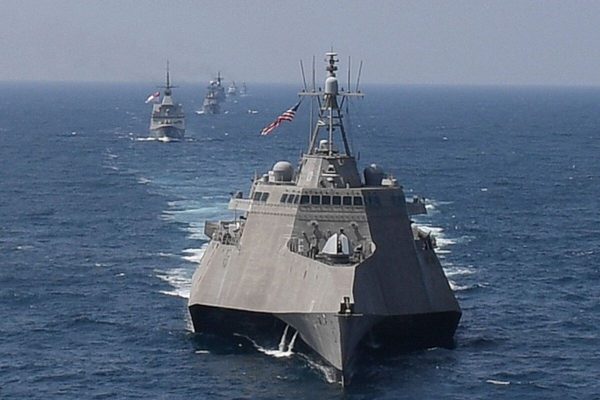Don’t let national security state spin keep you up at night.
America’s Strategy Should Put America First

National security starts at home.
Before the Middle East again took center stage, a RAND Corporation wargame drew headlines last year when it was reported that U.S. forces kept losing in simulations. “When we fight Russia and China, blue [the U.S.] gets its ass handed to it,” said RAND analyst David Ochmanek. Planes blown up on runways, carriers sunk, notional Eastern Europe littered with notional smoking Abrams tanks. American primacy, we are told, is at stake.
How does the Pentagon intend to fix this? Money, of course! $24 billion a year, they said, a drop in the bucket in a $700 billion defense budget. Missiles, missile defense, and artificial intelligence will save our tanks and our ships—especially the pixelated ones on an analyst’s screen.
The solution is always money and programs in the world’s largest office building. To paraphrase Churchill, spending is easy, thinking is hard. But let’s try a little thinking here.
We could start by asking why America has any need or desire to fight Russian forces in Europe, especially in the nigh-undefendable Baltic states. Nearly 30 years after the fall of the Berlin Wall, we still have 60,000 troops in Europe. Russia, regardless of concocted political hysteria in the United States, is not the Soviet Union. It is a regional power, one with an enormous nuclear arsenal and revived ground forces, but a regional power nonetheless.
Even if one buys the most revanchist and offensive interpretation of Vladimir Putin’s actions, Europe can easily defend itself. Germany, France, and the U.K. collectively have double Russia’s GDP, even when measured by purchasing power parity. Germany, the world’s fifth largest economy and one of the biggest NATO free riders, could singlehandedly match Russia’s defense spending if it so chose.
The money the U.S. spends directly on NATO itself is small, as pundits and politicians disingenuously remind us. But American participation in NATO has two major negative impacts. The first is that it enables the Europeans to both free ride on American protection and to avoid making hard decisions about their national security priorities. The primary security threat to Europe in the future is unlikely to speak Russian.
Terrorism and mass migration from Africa and the Middle East, driven by economic stagnation, corrupt authoritarian regimes, and climate change, will surely matter far more than T-90 tanks or “little green men.” This has finally been acknowledged, by no less a figure than French President Emmanuel Macron. Macron, of course, drew jeers from all quarters for saying NATO was in the midst of “brain death.”
For the United States, this foolish commitment to defending someone else’s rich continent distorts both our defense spending and force structure. America simply does not need a large land army. The United States is blessed by geography to a greater degree than any major nation on earth.
One is reminded of an old line often trotted out by foreign policy realists. Jules Jusseraud, French ambassador to the United States, wrote a century ago that America “is blessed among the nations. On the north, she has a weak neighbor; on the south, another weak neighbor; on the east, fish, and the west, fish.”
Despite all the talk of “the global village” and the pace of technological progress, Jusseraud’s Law remains in effect. The United States is still surrounded by weak neighbors and fish. Geographic distance from disorder and potential enemies still matters. America is a maritime power with no serious threats in its entire hemisphere. Our intractable wars in the Middle East have only served to underscore this basic strategic reality.
China is the lone potential existential threat to peace and prosperity for the United States. Our competition with China is likely to be primarily political, economic, and technological, but its military component will be naval. Not even the most blinkered AEI intern wants to invade China.
The United States Navy is the world’s only true blue-water fleet, but decades of foolish “transformational” shipbuilding programs, an overworked and undertrained corps of sailors, and the diversion of attention to land war in the Middle East have combined to erode our dominance at sea. The U.S. Army could be halved tomorrow and Americans would be no less safe. The same cannot be said for the U.S. Navy.
After years of a comfortable Pentagon truce whereby few rice bowls went empty, the Chief of Naval Operations, Admiral Mike Gilday, broke ranks this week and said that following the United States’ new National Defense Strategy requires allocating more money to the Navy, at the expense of the Army and Air Force. Admiral Gilday is right—but one wishes him a lot of luck.
The Threat Within
The sky is not falling because of a wargame though, even one by a deservedly respected institution like RAND. A wargame can prove whatever you want it to. It is a parlor game among some defense analysts to try to guess the funder of a wargame based upon its outcome.
Future war never follows the scripts we have laid out, even those from the best credentialed and compensated of think tankers. Former Secretary of Defense Robert Gates (though a contributor to our current predicament) had it right. As he told West Point’s cadets in 2011, “In the forty years since Vietnam, our record in predicting where we will be militarily engaged next, even six months out, is perfect: we have never once gotten it right.”
If we want to think a moment longer, we might begin to ponder whether our vaunted military can defend us against the gravest threats to American security and prosperity. Flanked by oceans, protected by a vast nuclear arsenal, and less dependent on trade than any major economy in the world, America is still remarkably secure from without. Within, things look much worse. Greed, factionalism, and internal fracture are likely to be greater threats to the Republic than any Chinese submarine or Russian missile.
Abraham Lincoln’s words to the Young Men’s Lyceum of Springfield, Illinois, nearly 182 years ago, still ring true:
At what point shall we expect the approach of danger? By what means shall we fortify against it?– Shall we expect some transatlantic military giant, to step the Ocean, and crush us at a blow? Never!–All the armies of Europe, Asia and Africa combined, with all the treasure of the earth (our own excepted) in their military chest; with a Buonaparte for a commander, could not by force, take a drink from the Ohio, or make a track on the Blue Ridge, in a trial of a thousand years.
At what point then is the approach of danger to be expected? I answer, if it ever reach us, it must spring up amongst us. It cannot come from abroad. If destruction be our lot, we must ourselves be its author and finisher. As a nation of freemen, we must live through all time, or die by suicide.
Then again, spending is easy.
The American Mind presents a range of perspectives. Views are writers’ own and do not necessarily represent those of The Claremont Institute.
The American Mind is a publication of the Claremont Institute, a non-profit 501(c)(3) organization, dedicated to restoring the principles of the American Founding to their rightful, preeminent authority in our national life. Interested in supporting our work? Gifts to the Claremont Institute are tax-deductible.
Our elite forces are not so elite.
After a bad round of war games, America wonders which wars to fight and how to win them.



